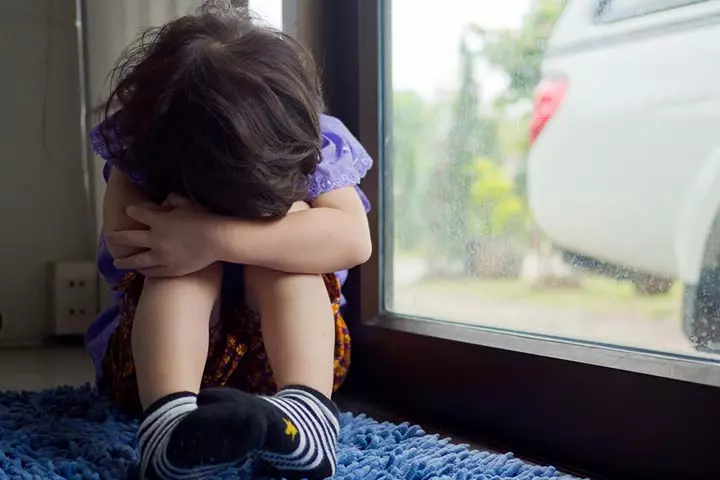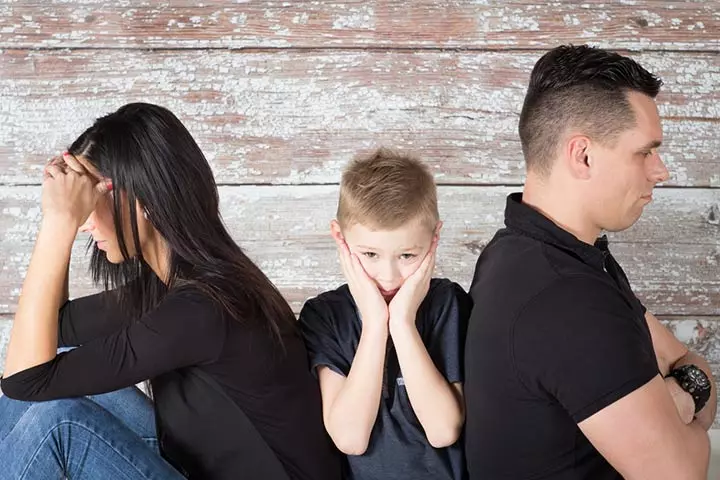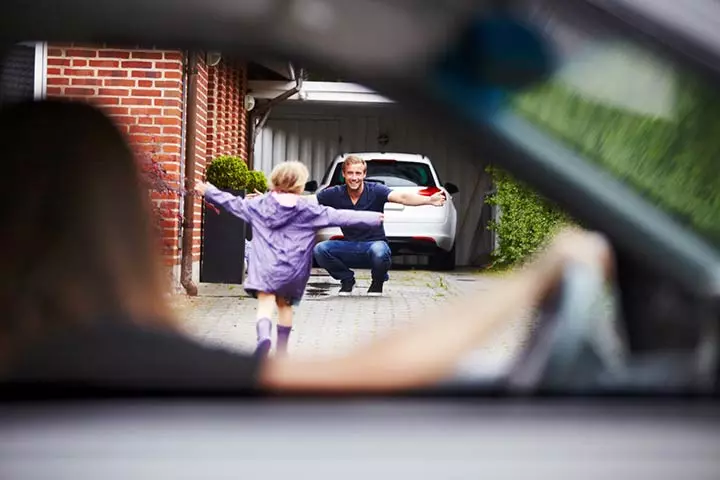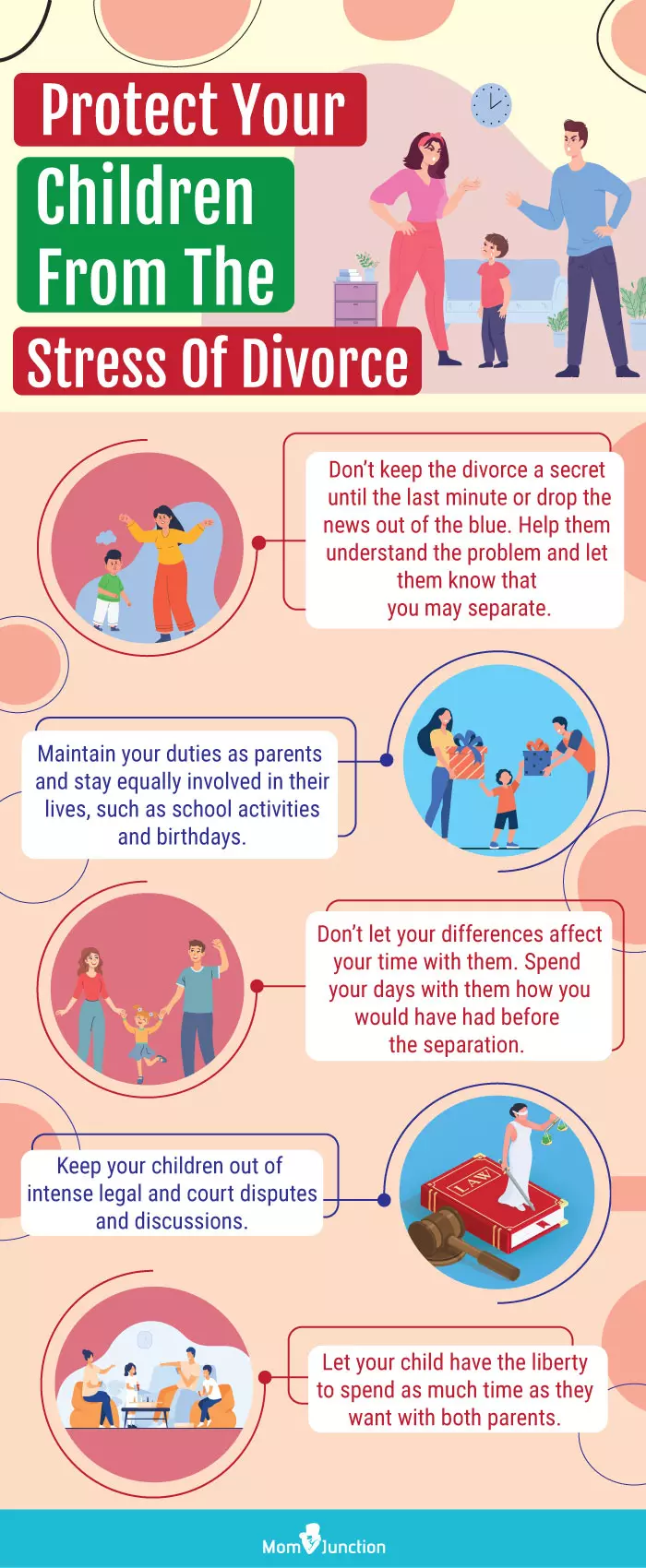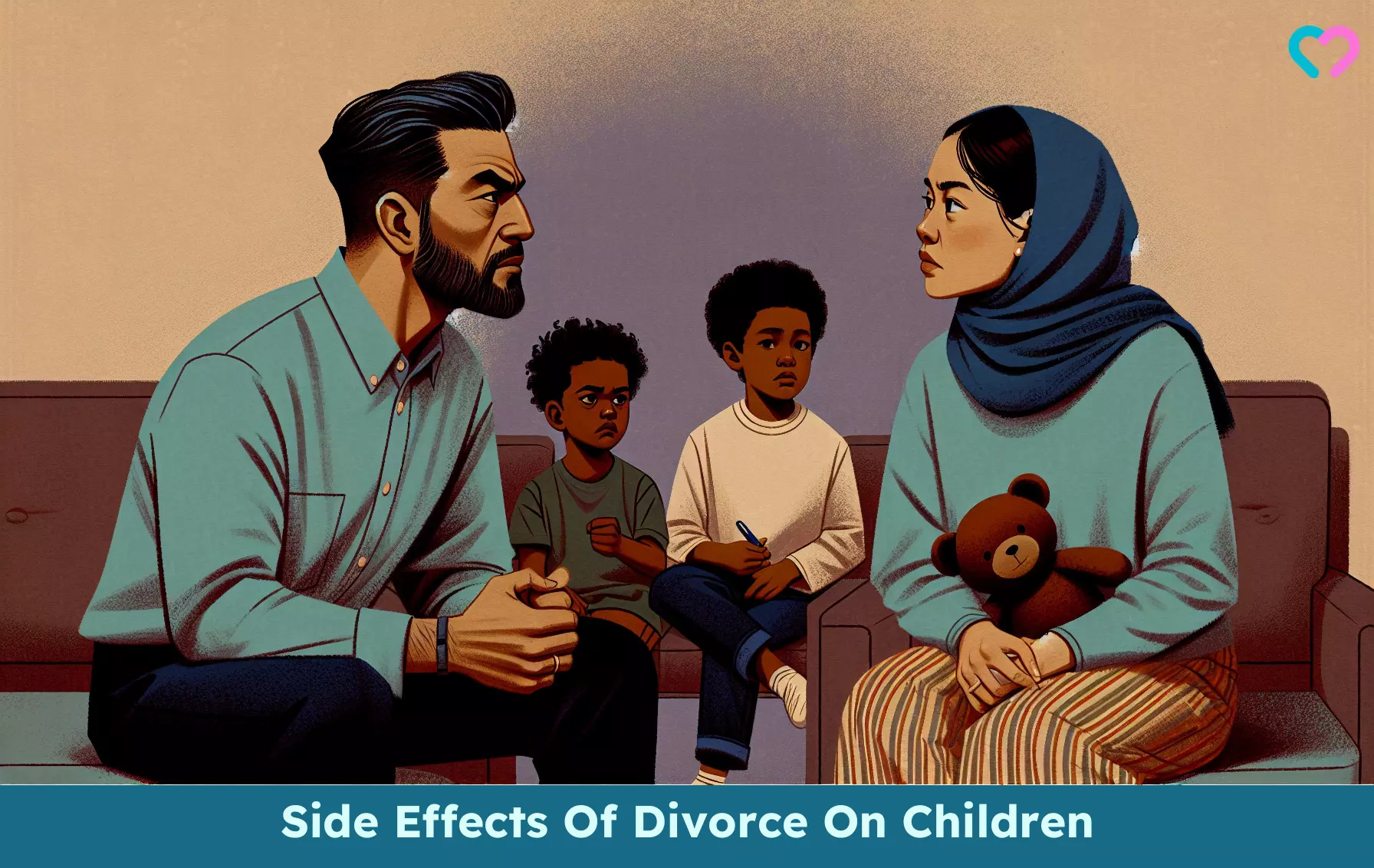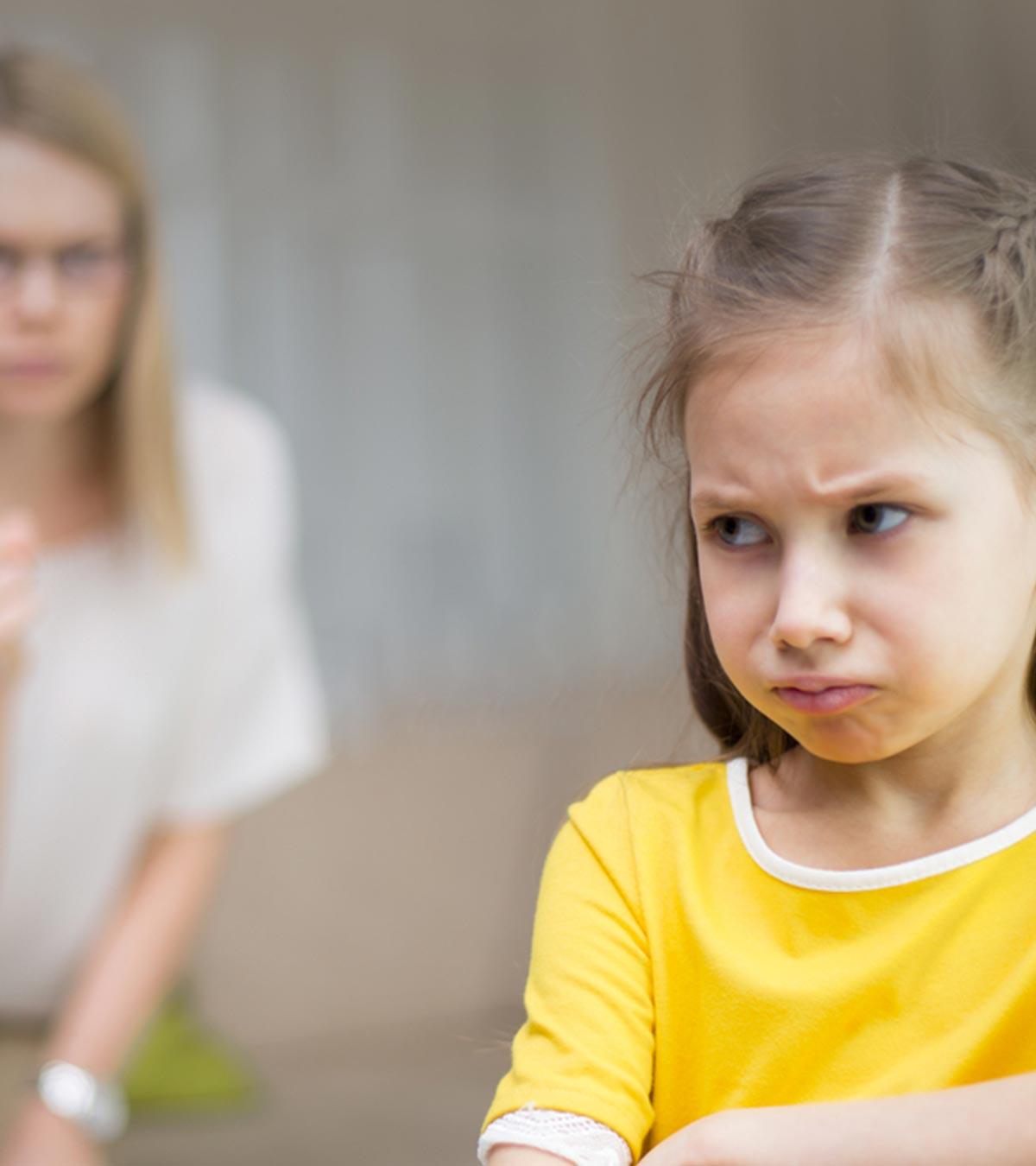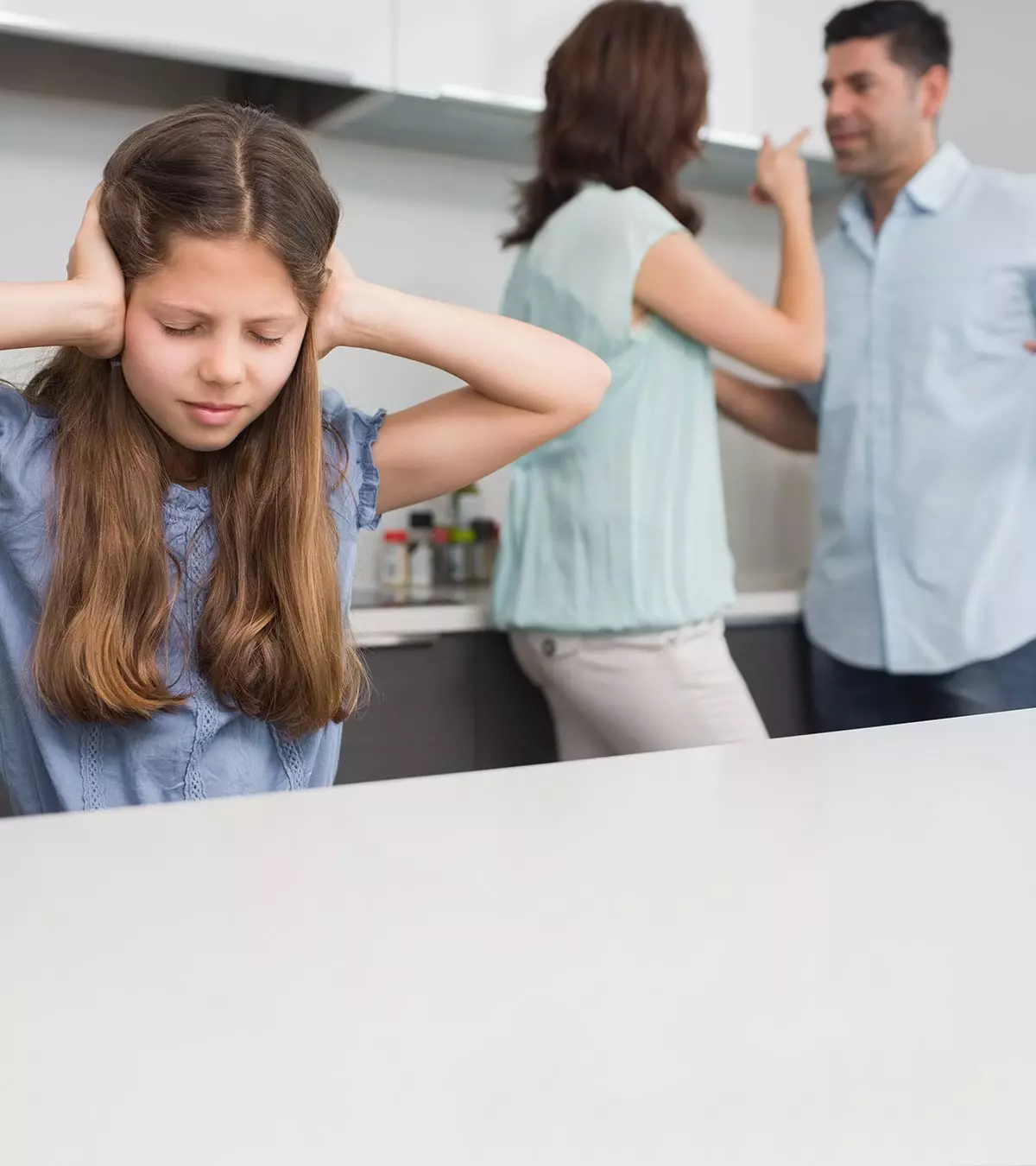
Image: Shutterstock
Divorce could be one of the most challenging phases in one’s life as it involves bringing an end to the marriage. However, the negative effect of divorce on children is known to be hard. A study reveals that in the US, the daughters of divorced parents have a higher divorce rate of 60% than 35% for sons (1). However, even after divorce, you can work with your better half to ensure that the end of your marriage does not impact your children.
Sometimes, parents might not know the after-effects of divorce on their child’s development. It is essential for couples to introspect and discuss the potential effects of divorce on the long-term mental and physical health of their children. In this post, we acquaint you with the challenges children might face when their parents decide to get divorced. We also suggest some ways to mitigate these negative effects and help children cope with the situation.
Key Pointers
- Divorce can impact children’s mental and physical health, leading to anxiety, stress, mood swings, irritability, intense sadness, and disillusion.
- Long-term effects of divorce on children may include social and behavioral problems, substance abuse, depression, and poor socio-economic position.
- Children living with a divorced parent often experience less conflict, leading to better grades and a reduced risk of addiction and negative influences.
- A child’s reaction to their parents’ divorce can be influenced by factors such as gender, age, and availability of emotional support.
- Mitigating a child’s suffering during divorce can involve informing them early, maintaining involvement in their lives, and avoiding prolonged custody disputes.
The Short-Term Effects Of Divorce On Children
When parents behave immaturely during a divorce and try to one up each other, children who witness a contentious relationship between their parents may sometimes have the following short-term effects.
- Separation anxiety: It is one of the most common emotional effects of parental divorce on children. Separating from a loved one results in feelings of nervousness or anxiety. They might develop a fear of abandonment or an apprehension that something ominous might happen to a family member due to separation. It is among children that often leads to a fear of getting abducted or being left alone. Some of the symptoms of separation anxiety that children may experience are headache, dizziness, stomach aches, diarrhea, and nausea (2). An anxious child will find it difficult to concentrate on his studies and may lose interest in activities that he once found enticing.
- Constant stress: According to the American Academy of Child & Adolescent Psychiatry, many children falsely consider themselves the reason behind their parents’ divorce and assume the responsibility to mend the relationship (3). This can lead to immense stress and pressure on the young mind, which can have several repercussions like negative thoughts and nightmares.
- Mood swings and irritability: Young children may suffer from mood swings and become irritable even when interacting with familiar people. Some children will go into a withdrawal mode, where they stop talking to anyone and shut themselves away. The child will become quiet and prefer spending time alone.
- Intense sadness: Divorce may push children into depression and sadness.
- Emotional sensitivity: Divorce can lead to a myriad of emotions in children. They may suffer from mixed feelings of anger, anxiety, and sadness, leaving them overwhelmed and emotionally sensitive. They often face the urge to vent their emotions by talking or communicating with someone to channel the process of divorce (4).
- Disillusion and distress: Children of divorce may feel hopeless and disillusioned because they do not have the comprehensive emotional support from their parents. This situation can worsen if the child is raised in a single-parent household with no access to the other parent.
Short-term effects of divorce can hamper a child’s psychological and physiological growth, which can have a long-term impact.
Long-Term Effects Of Divorce On Children
Things can get rough for a child who sees their parents bicker and separate. They can easily get affected by the events happening around them. The following are the long-term effects of divorce on children.
7. Behavioral and social problems
A child is at a greater risk of developing violent and antisocial behavioriBehaviors that cause emotional or physical harm and distress towards others. when the parents divorce.
He or she may lose temper at the drop of a hat and show no hesitation assaulting someone. In the long run, it may lead to the development of a criminal mindset, especially during the adolescent years. Studies show that most children of divorce display traits of aggression and disobedience with varying degrees of intensity. Extreme cases of these conditions make the child a social misfit.
8. Trouble with relationships
When children grow up seeing a marriage fail, they develop doubts about love and harmony in a relationship. They may have trust and attachment issues and find it challenging to resolve conflicts in any interpersonal relationships. Such children, as adults, will start any relationship with a negative mindset. Parental alienation can also make social adjustment difficult for the child.
9. Prone to substance abuse
Drugs and alcohol become the avenues for adolescents to vent out their frustration and anxiety. Research has shown a higher incidence of substance abuse in teens whose parents are divorced (5). Of course, there are other factors like the care provided by the single parent, which determine the adolescent’s tendency to have drugs. However, the probability of an adolescent succumbing to the temptation is considerably high. Long-term substance abuse has damaging effects on the well-being of the child.
10. Depression
The feeling of anguish and heartbreak caused by parents’ divorce can make a child slip into depression. Depression is a mental health problem, and children who witness divorce have a higher incidence of depression, social withdrawal, and self-esteem issues. Researchers note that divorce can be a contributing factor in cases of bipolar disorderiA mental condition that triggers extreme mood swings in a person, affecting their capacity to function, and energy levels. observed in children (6).
11. Poor academic performance and socio-economic position
The adverse psychological impacts of divorce diminish a child’s interest in education. Children who experience the divorce of their parents show a drastic drop in their school grades (7). It can impede a child’s academic engagement, focus, and performance due to emotional distress. A stunted progress in education hampers career prospects of the child as an adult, which makes it difficult to elude economic hardships in the future.
Divorce can take a toll on the children’s mental and physical health, but sometimes, separated parents are far better than quarreling parents. Don’t be surprised.
Single-Parent Families
Single-parent families are becoming increasingly common. According to a study by Pew Research Center, the US has the highest number of single-parent families, with about 23% of children under 18 living with a single parent, either mother or father (8) (9).
The graph illustrates the data gathered in a study by the Current Population Survey (CPS) on the number of single-parent and married-couple families with their own children under 18 through the years 1950 to 2022. The number of families with single parents has been consistently increasing over the years. The data also shows mother-only families are far higher than father-only families.
Families with own children under 18
Source: United States Census Bureau Trivia
TriviaThe Positive Side Of Divorce
Divorce is not limited just to the couple but extends to the entire family. The effects are long lasting. Despite the melancholy associated with it, there is a positive way to look at divorce from a child’s point of view.
Note that these positive effects are in comparison to a family of bickering parents and not a normal family with loving parents.
1. Happy parents denote a happy child
The child no longer has to experience a tense atmosphere at home as mom and dad will no longer quarrel. As they are no longer greeted by arguments, they return home from school or college with a positive mindset. It also ensures that the child does not wander away with bad company to avoid squabbling parents at home.
2. The child could be less prone to addiction
The deed is done and over. It means, the separated parents can now focus on the children as the task of getting divorced is completed. The kid does not have to rely on pseudo-comforters like drugs and alcohol.
3. The child spends quality time with parents
If the child is free to shuttle between the houses of his both parents, then he may spend fruitful time. His interactions are no longer interpreted by an argument, and he can pour his heart out freely. It also gives each parent an opportunity to divide the responsibility equally, and still be the caring mom or dad that they have been.
Children may even bond better with their parents after the divorce and may see them in a new light. This is what happened with Megan Llorente, an author and certified coach. Talking about her relationship with her father after his divorce, she says, “He wasn’t a bad dad, he was a bad husband. He never laid a finger on me, he never diminished me and I only have happy memories with him from growing up. My anger was purely based on what he did in his relationship with my mom, not on our own father-daughter relationship (i).”
4. Better grades
Research has shown that divorce can help a child study better and improve his grades since he no longer has the baggage of quarreling parents back home (11). Also, each parent dedicates their time for the child’s homework and studies.
5. Children may not repeat their parents’ mistakes
What happens when you see your parents’ marriage fail? You get the best life lesson on managing relationships. Studies about positive effects of divorce have shown that children who witness the split of their parents can show maturity and patience while managing conflicts in their relationships. They communicate better and always strive to be good by not repeating the mistakes of their parents.
This could be a positive way of looking at a divorce, if that is imminent. The child’s reaction to their parents’ decision depends on various factors such as the age of the child and gender.
 Do remember
Do rememberFactors That Determine A Child’s Reaction To Divorce
Following are some of the factors that play a significant role in the way a divorce affects the child:
1. Gender
Divorce affects boys and girls equally, but in some cases, a particular gender may show a more adverse reaction than the other. For example, depression due to divorce is higher in boys than in girls. On the other hand, girls have a greater tendency to develop severe behavioral problems (13). Overall, divorce has identical and equivalent levels of psychological reactions among children of both genders.
2. Age
The age of the child plays a critical role in the way he/she reacts to the split of their parents:
i) Toddler/preschooler
- An infant is too young to understand a divorce, so it is only when the child is a toddler that the separation starts making a difference.
- The effects of divorce on a toddler are elementary yet may grow profound. A toddler observes that one parent is not part of his or her life anymore, but does not understand the reason. The child may insist on meeting the other parent, and will throw a tantrum for it.
- Toddlers can feel nervous, become clingy, and cry when missing the other parent, or when they find the absence of a parent confusing.
II) Early Schooler
- The child can comprehend that something is wrong in the relationship of his mother and father. He can connect the split with the relationship problem, but may not discern the purpose of a divorce.
- Early schoolers may experience stress and anxiety when they realize that they will no longer be living with both parents.
- May show poor appetite, loss of interest in playing with friends, and would request the guardian parent to get back together with the other parent.
III) Preteen
- Preteen can interpret divorce but will oppose or resist accepting it. He/she may repeatedly sneak out from the guardian parent to meet the other parent, and argue if caught.
- Will show poor grades and loss of interest in studies. He will also grow irritable on trivial matters.
- The child may consider themself as the cause of the divorce and will try to reunite the parents.
IV) Adolescents
- Adolescents/teenagers understand divorce and have clear cognition of the reasons behind it. They may experience emotional distress seeing their parents parting ways.
- An adolescent will suffer poor grades, withdraw from his current friend circle, and may cut off his relatives as well. He/she may also stop speaking to one or both the parents due to anger and frustration.
- May show first signs of inclination towards substance abuse like addiction towards alcohol and narcoticsiA drug that lessens pain, promotes sleep, causes coma, and may change how people feel, think, or act. . Also, if in a relationship of his/her own, then they will tend to be abusive and quarrelsome due to stress.
3. Availability of emotional support
If the child has a backup emotional support system, it can significantly mitigate the negative effects of parents’ divorce. Emotional support could range from having supportive friends and siblings to grandparents who foster the child while the biological parents resolve the divorce. In some cases, the single parent may handle the situation in a calm and rational manner to ensure that the child does not suffer any adverse influence of the divorce.
It is clear that suffering is inescapable for the child, but you can provide emotional support to help them during this challenging time.
How To Mitigate A Child’s Suffering In A Divorce
It is okay for a wife and husband to split, but a mother and father must always stay together for the sake of their children. Understanding the reasons for divorce is crucial, as addressing them may help prevent further family conflict. Perhaps the best way to prevent a child from suffering is to try and resolve these issues and get back together as a happy family. However, if that is not possible, following are some tips to keep the little one mentally strong:
1. Do not keep the impending divorce a secret
Revealing an imminent divorce at the last moment can confuse and shock the child. Inform the child about your decision way before you arrive at it. Tell them that mom and dad have decided to live separately, and they are not the reason behind it. Do not demean or blame your partner for the divorce, and keep your words child-friendly.
2. Continue to stay involved as parents
The American Academy of Child & Adolescent Psychiatry states that children of divorce maintain better academic performance when the parents continue to remain involved in their upbringing. Despite the divorce, ensure you celebrate all important family events, especially your child’s birthday, together. Continue to guide your child as a parent so that he/she has a healthy childhood. Tell them that your decision should not influence their life and that they continue to have a normal life with activities like going to school, studying, and playing with friends.
3. Maintain a healthy routine
This is applicable especially to toddlers and preschoolers. Do not let divorce disrupt the routine of your child when he/ she is a toddler or an infant. Keep feeding, bathing, and sleeping, all at the same time like it was before. Cuddle with the child and make it a point to spend quality time. It will all bring a sense of normalcy in the life of the child.
4. Avoid long and murky custody disputes
A custody battle is the ugly legal spat between divorcing couples about the guardianship rights of the child. It is settled in a court of law and can take an awfully long time to resolve. Children can find the experience stressful especially if the court puts the onus on the child, by asking him/her to choose one parent. To prevent agony to the child, keep him/her out of any legal proceedings. Instead, opt to nurture the child together as parents, despite splitting as a couple.
5. Do not forbid meetings with the other parent
If you win the custody of the child, then do not restrict or prevent the child from meeting the other parent. Remember, your ex-spouse is still the biological parent of your child and has as much right as you do. When children have access to both parents, they have a normal childhood, even if the parents do not live together under the same roof.
These tips can help prevent long-term mental scarring of the child, and let them have a happy and normal childhood.
Frequently Asked Questions
1. At what age does divorce affect a child the most?
Children can be impacted by their parent’s divorce at any age, although this is debatable. Younger children find it challenging to adjust, but older children may process the separation since they can understand relationship statuses better.
2. Can divorce cause PTSD in a child?
Children who witness a divorce resulting from domestic violence or interparental aggressioniA type of violence involving physical aggression between both the parents. may be emotionally affected by it, It may cause them trauma and increase the risk of developing post-traumatic stress disorderiA condition that may be triggered due to exposure to a traumatic incident. in the long term (14).
3. Should I stay in an unhappy marriage for my child?
Deciding whether to stay in an unhappy marriage for the sake of your child is a complex and personal decision. It is essential to weigh the emotional and psychological effects on your child, evaluate the possibility of cooperative co-parenting, prioritize your own well-being, and seek objective advice to make an informed decision that prioritizes the overall well-being of everyone involved.
Going through a divorce is a stressful time for the entire family, and it has a higher chance of imparting negative effects on the children. Therefore, you should ensure that your separation does not leave the children feeling lost and without guidance. Managing both the short-term and long-term effects of divorce in children with patience and understanding will help them accept the situation better. Also, it would not affect your children’s lives and relationships negatively.
Infographic: How To Mitigate A Child’s Suffering In A Divorce
Seeing their parents separate and adjusting to a new life where they may need to go back and forth between their parents can take a toll on children’s mental health. So if you are going through a divorce, we bring effective tips on navigating through the process by shielding them from pain and trauma. Illustration: Momjunction Design Team
Illustration: Side Effects Of Divorce On Children
Image: Dall·E/MomJunction Design Team
In this insightful video, we explore effective strategies to help children navigate the challenges of divorce, providing guidance and support during this sensitive time.
Personal Experience: Source
MomJunction articles include first-hand experiences to provide you with better insights through real-life narratives. Here are the sources of personal accounts referenced in this article.
i. What It’s Like to Be a Child of Divorce and 3 Lessons for Parents.
https://medium.com/a-parent-is-born/what-its-like-to-be-a-child-of-divorce-and-3-lessons-for-parents-3942499eb1b2
References
- PCA Parent Pages.
https://www.prestonwoodchristian.org/uploaded/Parent_Pages_-_Sex_and_Dating.pdf - Separation Anxiety.
https://my.clevelandclinic.org/health/diseases/separation-anxiety-disorder - Children and Divorce.
https://www.aacap.org/AACAP/Families_and_Youth/Facts_for_Families/FFF-Guide/Children-and-Divorce-001.aspx - What are the Effects of Divorce on Children?
https://www.familymeans.org/effects-of-divorce-on-children.html#:~:text=Children%20often%20wonder%20why%20a,lead%20to%20many%20other%20issues. - Vanessa Hemovich and William D. Crano; (2009); Family Structure and Adolescent Drug Use: An Exploration of Single-Parent Families.
https://www.ncbi.nlm.nih.gov/pmc/articles/PMC3075408/ - Patrick F. Fagan and Aaron Churchill; (2012); The Effects of Divorce on Children.
https://downloads.frc.org/EF/EF12A22.pdf - Andrew J Cherlin et al.; (1991); Longitudinal Studies of Effects of Divorce on Children in Great Britain and the United States.
https://www.proquest.com/openview/e9ccb34d02ce4774722398c7f3d20d68/1?pq-origsite=gscholar&cbl=1256 - Single parenting and today’s family.
https://www.apa.org/topics/parenting/single-parent - National Single Parent Day: March 21, 2022.
https://www.census.gov/newsroom/stories/single-parent-day.html - The Impact of Family Structure on the Health of Children: Effects of Divorce.
https://www.ncbi.nlm.nih.gov/pmc/articles/PMC4240051/ - Divorce’s effect on children’s educational achievement is not a constant.
https://newsroom.ucla.edu/releases/divorce-effect-children-educational-achievement-not-constant - The effects of divorce in a society with ever-changing family structures.
https://scholarworks.uni.edu/cgi/viewcontent.cgi?article=1281&context=grp - Robert Hughes, Jr.; (1995); The Effects of Divorce on Children.
https://www.ideals.illinois.edu/items/14495 - Gayla Margolin and Katrina A. Vickerman; (2007); Post-traumatic Stress in Children and Adolescents Exposed to Family Violence: I. Overview and Issues.
https://www.ncbi.nlm.nih.gov/pmc/articles/PMC2811337/
Community Experiences
Join the conversation and become a part of our nurturing community! Share your stories, experiences, and insights to connect with fellow parents.
Read full bio of Eva Mendes
Read full bio of Sagari Gongala
Read full bio of Shikha Thakur
Read full bio of Apoorva K






